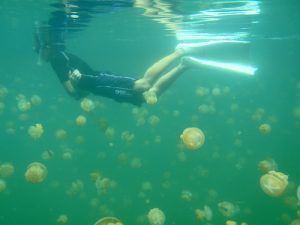 Tiny pieces of plastic invisible to humans is likely behind the death of thousands of Mediterranean mammals, turtles, and fish.
Tiny pieces of plastic invisible to humans is likely behind the death of thousands of Mediterranean mammals, turtles, and fish.
Maurice once speculated whether the Mediterranean has a plastic waste situation comparable to that of the Pacific, an issue particularly sensitive to our favorite eco-hunk David de Rothschild. His hunch – informed by empirical evidence along the shoreline – was painfully accurate. Because according to Nature Middle East, plastic waste is a big killer in the Mediterranean. An awareness and research campaign that started to collect water samples along the sea’s northern coast has found that at least 100,000 marine mammals, turtles and birds are killed every year.
Called Mediterranean EnDanger (MED), the campaign will evaluate first the northern countries and then move towards the southern Mediterranean countries to determine the extent of the sea’s plastic problem.
Already the MED team has discovered off the coasts of France, Italy, and Spain at least 250 billion microscopic pieces of plastic that are invisible to the human eye.
According to Nature Middle East, plankton eat these microscopic pieces, and creatures further up the food chain then feed on them until the accumulation of plastic in their bodies becomes unsafe. How this impacts on humans has yet to be established, but it is fair to say that a plastic food chain is not healthy.
Unfortunately, the microplastic wastes are difficult to manage because they are insidiously small.
“There is really nothing we can do to eliminate this danger. If we vapourize plastic waste it will still end up inside planktons,” the expedition leader and marine biologist Bruno Dumontet told the journal.
“That is why we need to put an end to this pollution through awareness campaigns and through stricter rules.”
The mission will move towards Morocco, Tunisia, Libya and Malta later this year.
“In 2013 we’ll conclude by visiting the south-eastern regions like Egypt, Lebanon and Syria. Only then will we have a complete analysis of all the waters of the Mediterranean Sea and be able put together a strong and detailed report about the current situation,” said Mr. Dumontet.
Mustapha Belhadid, a marine biologist at the Institute of Marine Sciences and Coastal Management in Algeria expects that the southern Mediterranean is less polluted than the north.
“We’ve analyzed the entire Algerian coast and found pollution was less than we expected. We’re far from satisfied with the current status quo. I think the study from MED is extremely important especially since it has an awareness angle.”
More on the Mediterranean Sea:
Is The Mediterranean Harboring a Giant Plastic Patch?
Mediterranean Countries Shut Down Coral Protection
Lebanon’s Mediterranean Apocalypse: Scuba Diving In Waters Devoid Of Life
image via Kevin Krejci


